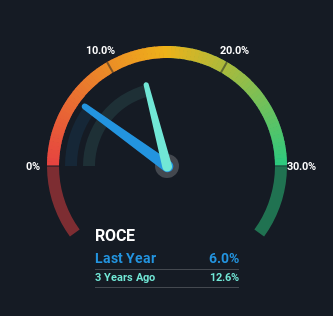- China
- /
- Metals and Mining
- /
- SHSE:601388
Be Wary Of Yechiu Metal Recycling (China) (SHSE:601388) And Its Returns On Capital
There are a few key trends to look for if we want to identify the next multi-bagger. Firstly, we'll want to see a proven return on capital employed (ROCE) that is increasing, and secondly, an expanding base of capital employed. Basically this means that a company has profitable initiatives that it can continue to reinvest in, which is a trait of a compounding machine. However, after briefly looking over the numbers, we don't think Yechiu Metal Recycling (China) (SHSE:601388) has the makings of a multi-bagger going forward, but let's have a look at why that may be.
Return On Capital Employed (ROCE): What Is It?
If you haven't worked with ROCE before, it measures the 'return' (pre-tax profit) a company generates from capital employed in its business. To calculate this metric for Yechiu Metal Recycling (China), this is the formula:
Return on Capital Employed = Earnings Before Interest and Tax (EBIT) ÷ (Total Assets - Current Liabilities)
0.06 = CN¥286m ÷ (CN¥5.7b - CN¥864m) (Based on the trailing twelve months to September 2023).
So, Yechiu Metal Recycling (China) has an ROCE of 6.0%. On its own, that's a low figure but it's around the 6.6% average generated by the Metals and Mining industry.
Check out our latest analysis for Yechiu Metal Recycling (China)

Above you can see how the current ROCE for Yechiu Metal Recycling (China) compares to its prior returns on capital, but there's only so much you can tell from the past. If you'd like to see what analysts are forecasting going forward, you should check out our free analyst report for Yechiu Metal Recycling (China) .
What The Trend Of ROCE Can Tell Us
When we looked at the ROCE trend at Yechiu Metal Recycling (China), we didn't gain much confidence. Over the last five years, returns on capital have decreased to 6.0% from 11% five years ago. And considering revenue has dropped while employing more capital, we'd be cautious. This could mean that the business is losing its competitive advantage or market share, because while more money is being put into ventures, it's actually producing a lower return - "less bang for their buck" per se.
On a side note, Yechiu Metal Recycling (China) has done well to pay down its current liabilities to 15% of total assets. That could partly explain why the ROCE has dropped. Effectively this means their suppliers or short-term creditors are funding less of the business, which reduces some elements of risk. Some would claim this reduces the business' efficiency at generating ROCE since it is now funding more of the operations with its own money.
Our Take On Yechiu Metal Recycling (China)'s ROCE
From the above analysis, we find it rather worrisome that returns on capital and sales for Yechiu Metal Recycling (China) have fallen, meanwhile the business is employing more capital than it was five years ago. Investors must expect better things on the horizon though because the stock has risen 4.3% in the last five years. Either way, we aren't huge fans of the current trends and so with that we think you might find better investments elsewhere.
If you want to continue researching Yechiu Metal Recycling (China), you might be interested to know about the 2 warning signs that our analysis has discovered.
For those who like to invest in solid companies, check out this free list of companies with solid balance sheets and high returns on equity.
New: Manage All Your Stock Portfolios in One Place
We've created the ultimate portfolio companion for stock investors, and it's free.
• Connect an unlimited number of Portfolios and see your total in one currency
• Be alerted to new Warning Signs or Risks via email or mobile
• Track the Fair Value of your stocks
Have feedback on this article? Concerned about the content? Get in touch with us directly. Alternatively, email editorial-team (at) simplywallst.com.
This article by Simply Wall St is general in nature. We provide commentary based on historical data and analyst forecasts only using an unbiased methodology and our articles are not intended to be financial advice. It does not constitute a recommendation to buy or sell any stock, and does not take account of your objectives, or your financial situation. We aim to bring you long-term focused analysis driven by fundamental data. Note that our analysis may not factor in the latest price-sensitive company announcements or qualitative material. Simply Wall St has no position in any stocks mentioned.
About SHSE:601388
Yechiu Metal Recycling (China)
Engages in aluminum alloy recycling business in Asia and the United States.
Adequate balance sheet and slightly overvalued.
Market Insights
Community Narratives




